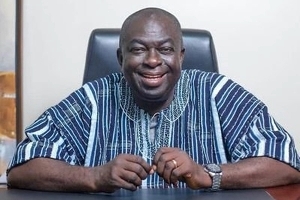- Home - Entertainment
- Lifestyle News
- Entertainment Videos | TV
- Year In Review
- Music News
- Entertainers
- Entertainment Archive
- Entertainment Photos
- Jokes
- Entertainment Headlines
- Ameyaw Debrah
- Brown GH
- Celebrities Buzz
- GH Base
- Ghana Celebrities
- Gh Gossip
- GH Page
- GH Splash
- Hot Gossip GH
- YEN

General News of Wednesday, 21 July 1999
Source: --
Denkyirahene elected President of National House of Chiefs
Kumasi, (Ashanti Region) 20 July '99,
Odeefuo Boa Amponsem III, Denkyirahene and President of the Central Region House of Chiefs, was on Tuesday elected unopposed as the new President of the National House of Chiefs at an emergency meeting in Kumasi.
He succeeds Osagyefo Kuntunkununku III, Okyehene, who went to the village on Wednesday, March 17, at the Ridge Hospital in Accra after a short illness.
Before the meeting, Naa (Dr) Puoure Puobe Chiir VII, Nandom-Naa and acting President of the House, asked members to observe a minute silence in honour of the late President of the House.
Mr David A. Kanga, Deputy Chairman of the Electoral Commission in-charge of operations who supervised the election told the meeting that at the close of nominations for the position on July six, Odeefuo Amponsem was the only candidate and declared him the new President of the House.
The Denkyirahene, 66, known in private life as John Kwame Amofa Appiah, is a product of Saint Augustine's College, Cape Coast and holds a diploma in public administration from Lincoln University in Pennsylvania, United States.
He was enstooled Denkyirahene on February seven, 1955 to succeed Nana Owusu Bori II.
Miss Justice Rose Owusu, Supervising High Court judge of Ashanti swore the new President of the House into office, and the other chiefs swore to him.
Odeefuo Boa Amponsem called for the co-operation and advice of the members and said he would live up to the confidence reposed in him adding that together " we can build a strong and forward-looking House ready for the challenges facing the chieftaincy institution.
He expressed his appreciation to the maturity and solidarity shown in his election.
Naa Puobe Chiir, Vice President of the House said chiefs in Ghana have made history by adopting consensus in the face of diverse interest and ethnic groups and expressed the hope that the concept would stay to serve as an example for politicians.
The Nandom-Naa observed that chieftaincy has a unique role in grassroots participation because it provides an indispensable source of leadership at the community level.
Chiefs, he said, have also served as disseminators of information on agriculture, education and a source of peace, tranquillity and progress in their communities.
"It is within the communities that lies the constant expectation that chieftaincy should serve as one of the most cherished institutions", he added.
He stressed the importance of justice and accountability and asked chiefs to ensure that justice is not delayed either because judicial committee members do not turn up regularly to hear cases or as a result of vested interests.
"When these are eliminated it would help reduce litigation; chieftaincy disputes and prevent some chiefs from being dragged to the courts", he said.
The Nandom-Naa appealed to the government to help chiefs in the performance of their judicial functions by increasing their allowances and said "100 cedis per kilometre is too low and night allowances should be paid to encourage members".










